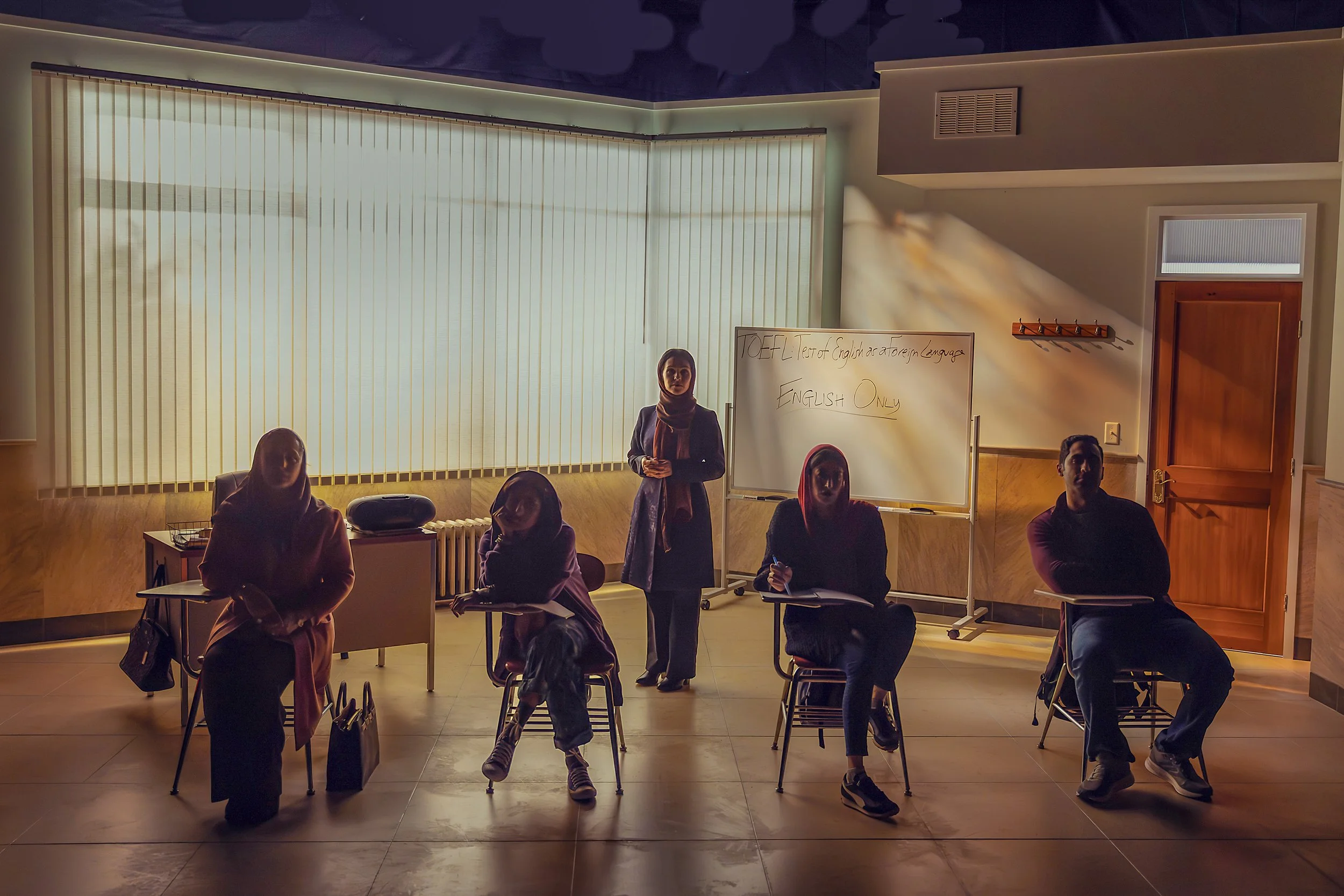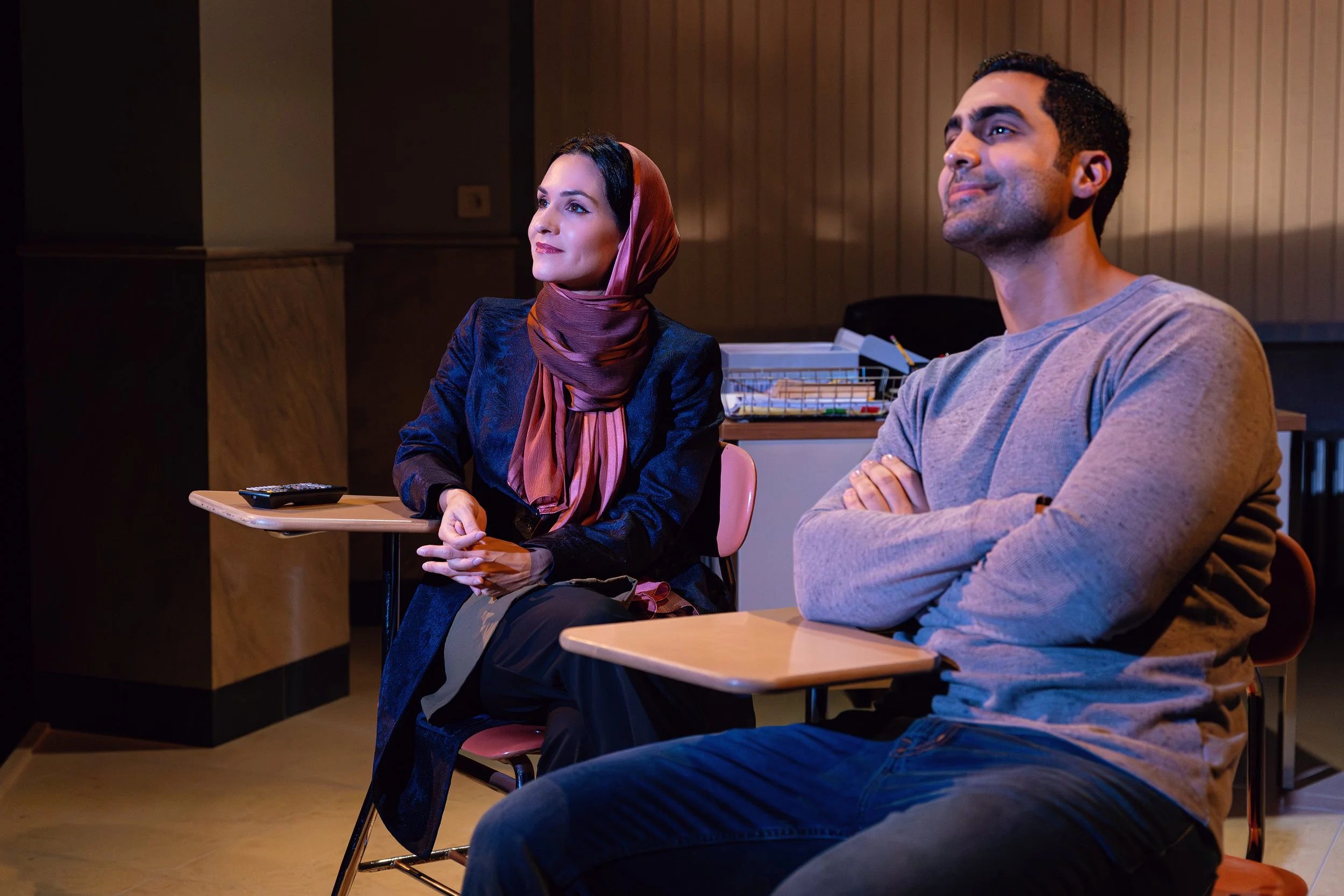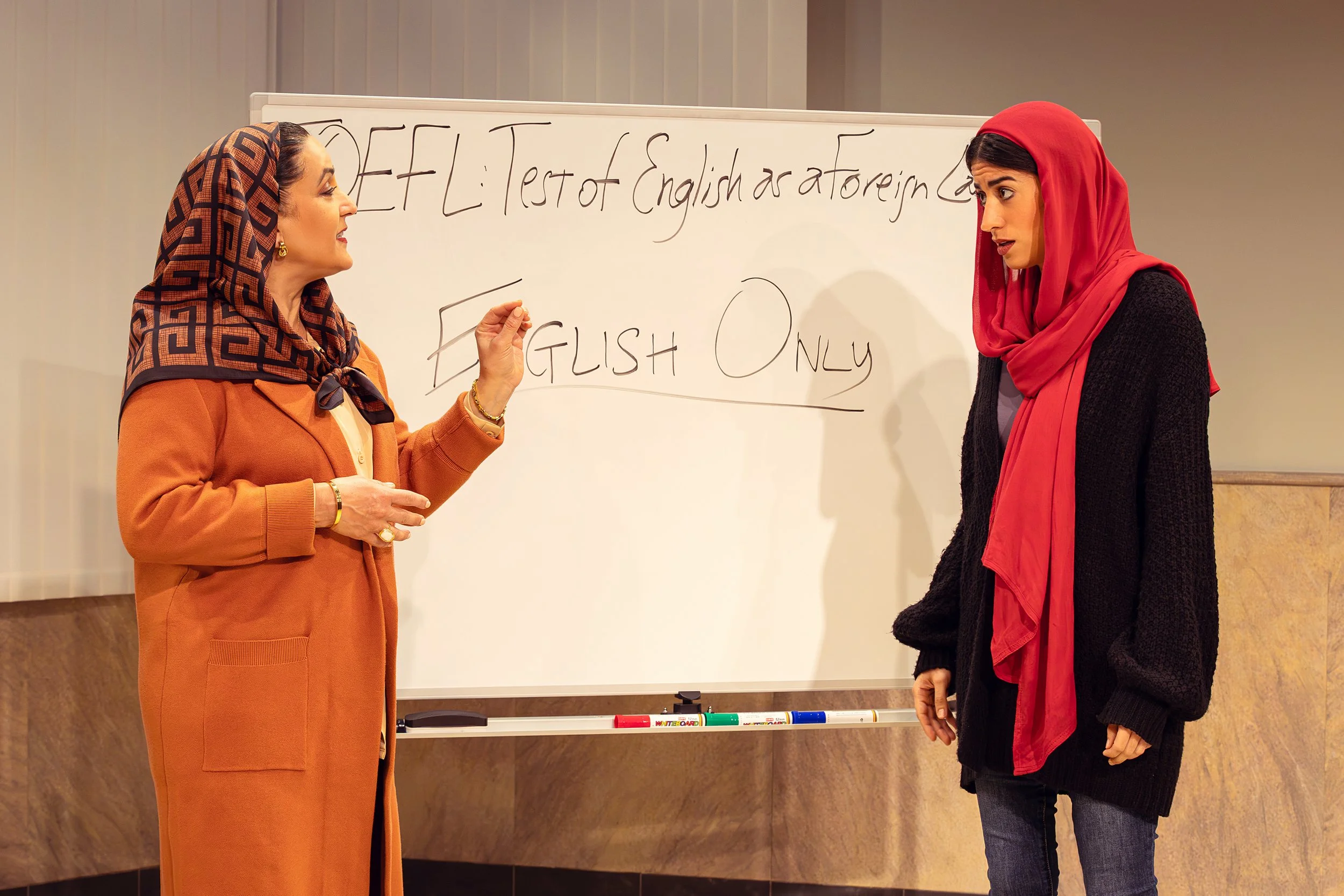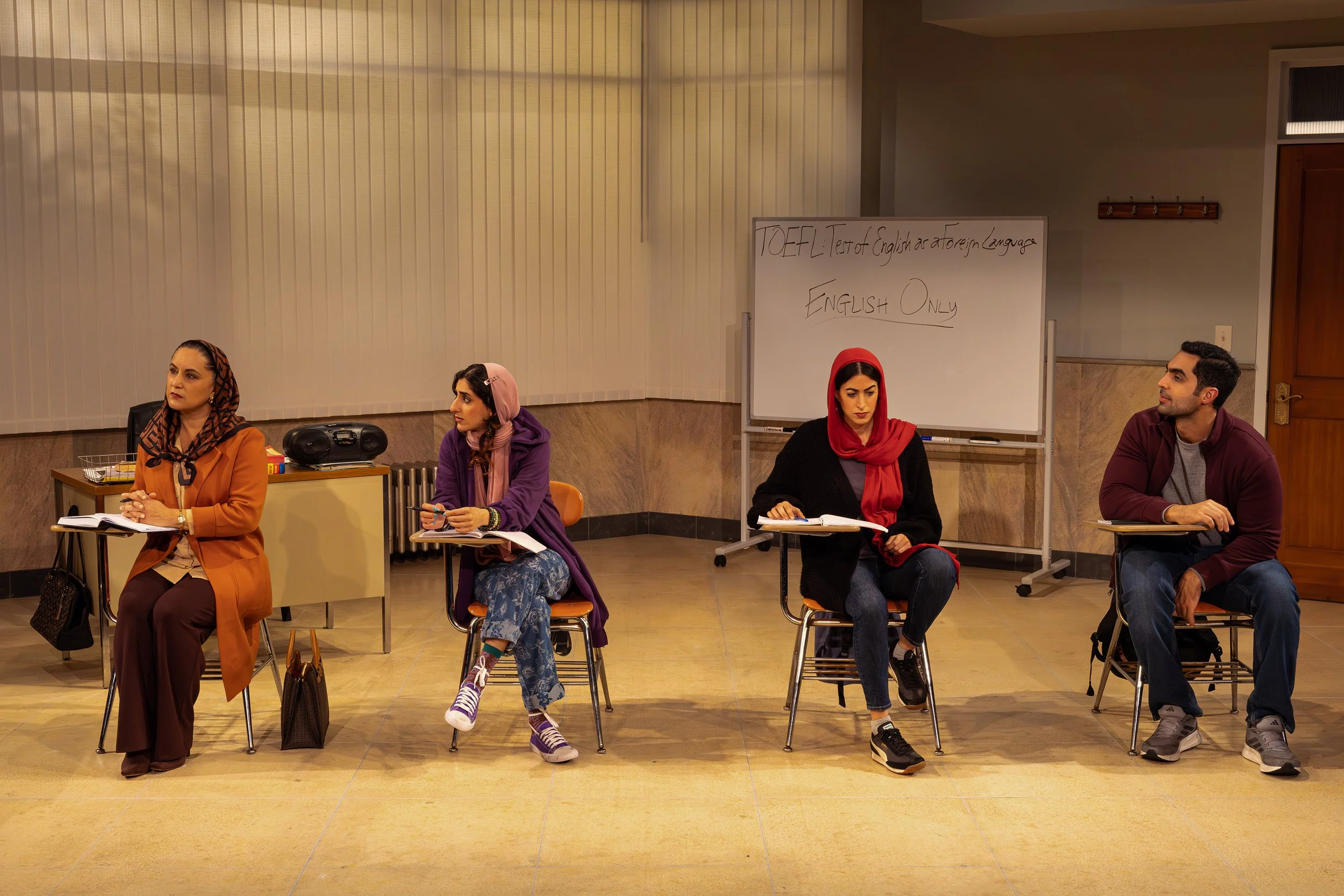Review of English, TheaterWorks, Hartford
Four student desks, a teacher's desk, a whiteboard on rollers, and a grand window with blinds. A woman enters and writes TOEFL: Test of English as a Foreign Language, and under it: English Only. The classroom is in Iran, and the four students are studying English to enhance their prospects in achieving their goals: for Elham, study in an English-based university, for Omid, to make use of his facility with English; for Roya, to reunite with her son's family expatriated to Canada; for Goli, simply to integrate more easily via the lingua franca of today's world. Goli begins the play by saying: English is like “rice, you can do anything you want with it.” That enabling factor will come under serious scrutiny in the course of Sanaz Toossi's Pulitzer-winning play English, playing at TheaterWorks through November 8. Like the class's teacher Marjan, the play remains upbeat throughout, though with many tensions.
Foreground, l to r: Roya (Pantea Ommi), Goli (Anahita Monfared), Elham (Sahar Milani), Omid (Afsheen Misaghi); background: Marjan (Neagheen Homaifar) in English, TheaterWorks Hartford; photo by Julian Brown
The superlative ensemble cast, directed by Arya Shahi, is a strong factor in the success of this lively production (as are Mary Ellen Stebbins’ Lighting Design and Dina El-Aziz’s Costume Design). Each character is easily differentiated, from the sweet and agreeable Goli (Anahita Monfared) to the competitive and discontented Elham (Sahar Milani), to Omid (Afsheen Misaghi), the only male and possessing almost no Iranian accent, to Roya (Pantea Ommi), a grandmother who, we suspect, may have already learned the best English she will ever speak.
Marjan (Neagheen Homaifar) in English, TheaterWorks Hartford; photo by Julian Brown
The backstory of Marjan (Neagheen Homaifar) is more intriguing: she spent time abroad in Manchester England, and speaks American English, not without accent. Though asked why she returned to Iran, she never quite explains, but, given her penchant for watching romantic comedies starring Hugh Grant, we suspect it may have had to do with a romance that did or didn't happen. She's now married with a daughter but says she doesn't speak English at home. Her love for the language—she believes conversing in English is one of "the greatest things two people can do together"—is largely restricted to the classroom where she tries her best to keep the students from lapsing into Farsi, their native tongue. Homaifar's excellent portrayal of Marjan shows us someone who is accommodating but also strict. She treats the students as younger than they are, with a tone that makes adults seem to be again in grade school. And, since the level of language she is teaching seems rather basic—we don't see anyone struggling with actually parsing written English—it's easy for her to assert the kindly insistence, somewhat detached yet parental, that seems de rigueur for any classroom teacher. We can't help wanting to know more about her.
Marjan (Neagheen Homaifar), Omid (Afsheen Misaghi) in English, TheaterWorks Hartford; photo by Julian Brown
Toossi's method in the play is to treat viewers to a succession of days in the classroom—sometimes the class session, sometimes Marjan's office hours. While nothing of great dramatic moment occurs, we learn how each student copes with the issues they face while trying to master a language that none seem to truly admire. For Goli, the language is exciting because she can decipher the meaning of Ricky Martin's "She Bangs," and Omid finds that English-language class is the only place he doesn't speak English with an accent, compared to the others. The students aren't beginners, but they still feel overwhelmed when listening to a straight-forward dialogue in basic English. The rigors of trying to learn a language is a major dramatic factor in the play, and all the classroom behavior—including some rudeness, favoritism, and awkward questions and answers—is finely observed and rendered. Milani's Elham, in particular, is the sort of figure who speaks loudly even when silent.
Roya (Pantea Ommi), Elham (Sahar Milani) in English, TheaterWorks Hartford; photo by Julian Brown
The central gimmick in the play is that each character speaks English with an accent and oftentimes haltingly or inexactly, much like any new speaker of a language, but their speech in Farsi is rendered as fluent English. The only time Farsi is heard is at the very end of the play, though, once that occurs, it makes us realize that we might have had greater insight into each person if we heard them switching between their native speech and an effort to make themselves understood in English. At least, we'd have a sense of how they sound in each tongue. As it is, we swiftly become aware of their dissatisfactions with English, and, more comprehensively, with a world that marginalizes their own language. Elham likes to fantasize a world in which Persia had not been eclipsed by British and American cultures. Her frustrations with basic English are apt as she has been accepted at an Australian university to study gastroenterology, so we can see how an English-speaking world makes success in her field even more daunting.
There are some surprises, but Toossi avoids any of the clichés of trauma or sudden reveals that so many plays of our time pile onto narrowly delineated characters. The central conceit— that we only know these characters in this one context, the classroom—gives the play its rationale for how it portrays them. The main, enduring theme, teased out in many apropos exchanges, is how the language we speak (and how we speak it) shapes us, giving us a sound and a personality to those we encounter. The students rightly assert that their true identities are altered or obscured by the way they are heard in English. While this may be something of a revelation for anyone who hasn't tried to speak another language, for those who have it’s a recognizable grievance.
Roya (Pantea Ommi), Goli (Anahita Monfared), Elham (Sahar Milani), Omid (Afsheen Misaghi) in English, TheaterWorks Hartford; photo by Julian Brown
Finally, the play suggests that there's more than just a question of one's comfort or readiness to explore other linguistic possibilities in learning a language. So much, we realize, is lost in translation—especially when moving from ancient and poetic Farsi to prosaic and demotic American English. These characters, standing for so many who try to make such adjustments, show how much hope and hardship and heartache and happiness is bound up with how we make sounds at one another.
Marjan (Neagheen Homaifar), Goli (Anahita Monfared) in English, TheaterWorks Hartford; photo by Julian Brown
English
By Sanaz Toossi
Directed by Arya Shahi
Set Design: Sadra Tehrani; Costume Design: Dina El-Aziz; Lighting Design: Mary Ellen Stebbins; Sound Design: Bahar Royaee; Casting Director: Gregory Jafari Van Acker / Bass / Valle Casting; Stage Manager: Tom Kosis; Associate Lighting Director: Nicholas Pollock
Cast: Neagheen Homaifar, Sahar Malani, Afsheen Misaghi, Anahita Monfared, Pantea Ommi
TheaterWorks, Hartford
October 2-November 2—extended to November 8, 2025





